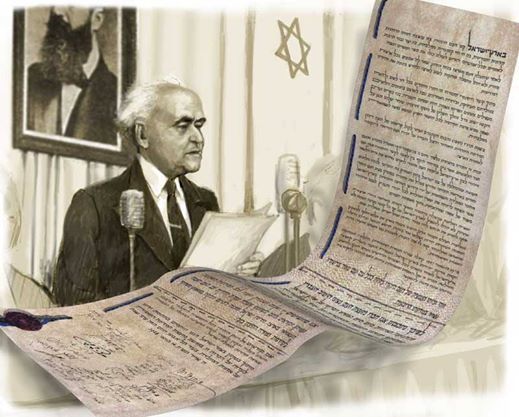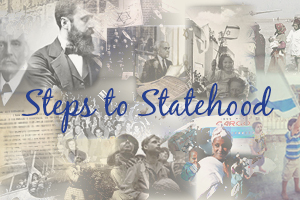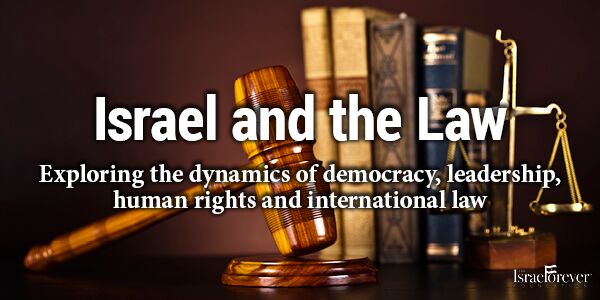What’s Wrong with Re-Affirming Israel’s Jewish and Democratic Character?
By David Daoud
Far from being the death-knell of Israeli democracy, the proposed “Jewish State” legislation—which was first promoted by the Center-Left Kadima party in 2011—should be seen as a fulfillment of Israel’s democratic tradition, and a continuation of the international events that give the country legitimacy.
“Accordingly, we … hereby declare the establishment of a Jewish state in eretz yisrael, to be known as the State of Israel.”
Most assume that this is a quote from the Jewish State Bill, proposed by Prime Minister Benjamin Netanyahu. In fact, it’s an excerpt from Israel’s Declaration of Independence, written by David Ben-Gurion, Israel’s first Prime Minister and head of the Left-wing Mapai party, and declared by him on the eve of Israel’s independence, on May 14, 1948.

Yet, even though its content is not appreciably different from Ben-Gurion’s declaration, analysts and politicians have been in an uproar over the Jewish State Bill, attacking it as a radical threat to Israeli democracy.
In fact, the actual language of the various recently proposed bills is remarkably innocuous. The legislation seeks to officially reaffirm the character of the State of Israel—“a Jewish and democratic state in the spirit of the principles of the Declaration of Independence”—as the national state of the Jewish people. This may seem redundant, but due to the intricacies of Israeli law, it is not.
An affirmation both of democracy and reality, such legislation is important as a complement to Israel’s Basic Law: Human Dignity and Liberty, which defines Israel’s democratic character, so that neither characteristic prevails over the other. “Both of these values are equal and both must be considered to the same degree,” says Netanyahu. In other words, at a time when Israel’s right to exist as a Jewish state is under unprecedented attack, all the “Basic Law: Israel as Nation State of the Jewish People” does is summarize and enshrine these realities in a single basic law.
In order to achieve this, the bill brings together all the various legal aspects of Israel’s unique Jewish existence.
- It describes the Land of Israel as the Jewish people’s “historic homeland” and “national home” where they realize their “right to self-determination in accordance with its culture and historic heritage,” making the right to self-determination in the State of Israel “unique to the Jewish people.” Just as instruments of international law (particularly Articles 6 and 7 of the Palestine Mandate), the Declaration of Independence, and the 1950 Law of Return (also signed into law by Prime Minister David Ben-Gurion) grant Jews special immigration rights to the State of Israel, so too does the Bill declare that “all Jews are eligible to immigrate to the country and receive citizenship of the state according to law,” and that the State would act to gather the exiles of the Jewish people.
- The bill binds Israel to act in assistance of Jews being persecuted because of their identity. It makes the State’s mission the preservation and cultivation of “the historical and cultural heritage of the Jewish People,” obligating all educational institutions to “teach the history, heritage and tradition of the Jewish people.”
- It makes Jewish law a source of inspiration for Knesset legislation, and allows courts, in the absence of “legislation, precedent or clear inference,” to draw on the “principles of freedom, justice, fairness and peace of the heritage of Israel.” Like other democratic constitutions, it defines the country’s national anthem (“Hatikva”), flag, and coat of arms. It makes the Hebrew calendar the official state calendar, and defines Yom Ha’Atzmaut (Independence Day), Yom Ha’Zikaron (Memorial Day for Fallen Soldiers), and Yom Ha’Shoah (Holocaust Memorial Day) as official state holidays, marking Jewish holidays and the Sabbath as be public holidays, but “the country’s public holidays.”
- The bill also defines Israel as a democratic state, bound to uphold the fundamental freedoms and individual rights of its citizens according to law. As a democratic state, Israel will also “act to enable all residents of Israel, regardless of race or nationality, to preserve their culture, heritage, language, and identity.” The bill also protects all holy places against desecration or any damage that might negatively affect worshippers’ access to these sites or their feelings, and grants “members of recognized faiths [the right] to rest on their Sabbaths and holidays,” paralleling Article 23 of the Palestine Mandate.
Finally, like the other Basic Laws, it disallows any infringement on individual rights, except by a law that “befits the values of the State of Israel…designed for a worthy purpose” and which is not excessive. All of this is in keeping with both Israeli and international law, as well as the basic political norms most Western countries apply to themselves.
Nonetheless, the non-controversial concepts enshrined in this bill have come under scathing and overwrought attack, based on straw-men arguments unconnected to the bill’s actual language, or based on now-rejected draft proposals.
The Jewish State Law is acceptable under both Israeli and international law, as well as under the basic political norms most Western countries apply to themselves.
This widespread concern, misrepresentation of the idea, and manufactured outrage, is all the more ridiculous when one recognizes that the bill’s conception is not an idea of the Right, or the Likud, or the government of Prime Minister Benjamin Netanyahu. In fact, the bill itself originated with MK Avi Dichter of the Center-Left Kadima party in 2011.
The bill’s vision of Israel as a Jewish state is much older, rooted in the instruments of international law which gave rise to the State of Israel itself.
The Jewish state’s rebirth was the result of the Jewish people’s physical and legal assertion of their national right to self-determination in their ancient homeland, and the international community’s de jure recognition of that right. Being a Jewish State was, and remains, the reason for Israel’s existence under international law.
Over the decades leading up to the independence of the State of Israel, international law encouraged and legally required the establishment of a Jewish state. Its proviso that a Jewish state should ensure and protect the civil, political, and legal rights of its non-Jewish minorities did not negate this. In fact, it strengthened it—as it would in the modern version of the conception currently under consideration—since it implicitly stated that international law did not see any inherent contradiction between such a state’s Jewish and democratic character.

Israel’s Declaration of Independence declares Israel a Jewish state that will “ensure complete equality of social and political rights to all its inhabitants irrespective of religion, race or sex; it will guarantee freedom of religion, language, education and culture; it will safeguard the Holy Places of all religions; and it will be faithful to the principles of the Charter of the United Nations.” It also called on Israel’s Arab citizens to “participate in the upbuilding of the State on the basis of full and equal citizenship and due representation in all its provisional and permanent institutions.”
At the same time, the Declaration asserts that the State of Israel is a Jewish state in no uncertain terms. Quite explicitly, the Declaration calls the Land of Israel “the birthplace of the Jewish people,” where their religious and political identity was shaped and where they first attained statehood.
It further notes that Theodor Herzl’s efforts led to the resurrection of “the right of the Jewish people to national rebirth (tekuma leumit) in its own country.” Israel’s raison d’être was to be a Jewish state in the Jews’ “national homeland” that “would open the gates of the homeland wide to every Jew and confer upon the Jewish people the status of a fully privileged member of the community of nations.”
The internationally recognized right of the Jewish people to “establish their state”—in other words, their right to self-determination—“is the natural right of the Jewish people to be masters of their own fate, like all other nations, in their own sovereign state.”
While the Declaration is neither law nor an ordinary legal document, it has legal standing in Israeli law. The third section, describing the democratic principles that guide the State of Israel, has been used by the Supreme Court for the purpose of normative interpretation. The second section, which declares the establishment of Israel as a Jewish state, is the primary source of authority in the Israeli legal system. Given that the Jewish State Bill endorses and echoes both of these sections, it cannot be called a radical revision of Israel’s Jewish or democratic character.
Basic Law: Israel as the Nation State of the Jewish People conforms to international law and Israel’s Declaration of Independence. This leaves the question of whether the law detracts from Israel’s duties as a democratic nation. Does it interfere with Israel’s obligations to ensure the rights, freedoms, and equality of its non-Jewish citizens?
The law itself offers the first answer, since it explicitly defines Israel as “Jewish and democratic.” Quoting the Declaration of Independence, it refers to Israel as a state “based on the foundations of freedom, justice and peace in light of the visions of the prophets of Israel” that “upholds the individual rights of all its citizens according to law.”
In accordance with the demands of international law, the law also guarantees that “the state will act to enable all residents of Israel, regardless of religion, race, or nationality, to preserve their culture, heritage, language, and identity.”
The law’s wording, in fact, is lifted verbatim from two laws long since passed by the Knesset which state, “where the court, faced with a legal question requiring decision, finds no answer to it in statute or case law or by analogy, it shall decide it in the light of the principles of freedom, justice, equity, and peace of Israel’s heritage.”
While Jewish law is not a source of law per se in the State of Israel, it can be used as judicial inspiration for comparison purposes—much as Jewish law has formed the basis and inspiration of western legal tradition dating back to its earliest origins.
If anything disproves the claim that the Jewish Nation State Law is a threat to religious freedom, it is that even though its legislature and judiciary have made use of Jewish law for almost seven decades, Israel is still a fundamentally secular state. The law does not change that.
The checks and balances the Israeli legal system has already set in place; in particular, the powers of the Israeli Supreme Court, one of the world’s most highly regarded independent high courts.
Since the 1980s, the Supreme Court—which includes Israeli-Arab justices—has established itself as an activist protector of human rights and the guardian of Israel’s secular identity. It routinely intervenes to promote civil liberties and equality between various sectors of the Israeli population, and acts as a court of first and last instance, exercising judicial review over all branches of government.
Israel’s professional and unpoliticized judiciary is “an important bastion of Israeli democracy,”and Israel’s Supreme Court has assumed “the task of major guardian of justice and civil rights in Israel…[and] has developed into a very dynamic actor in the governmental system,” striving to broaden the meaning of justice in Israel, and “ensuring for itself the role of fearless guardian of inherent rights.”
While Israel does not have a written constitution (similar to the United Kingdom), the Supreme Court still has a strongly democratic corpus of law to draw upon and which has constitutional status. In accordance with the Harari Proposal of June 13, 1950, Israel’s constitution “will be made up of chapters, each of which will constitute a separate basic law … and all the chapters together [emphasis own] will constitute the constitution of the State.”
Until the new law, 11 Basic Laws have been enacted. Several of them give the Supreme Court the power to overturn any cabinet or Knesset decision that violates the rights they enumerate. The Court has made it clear that it is willing to exercise this power. Additionally, many of the Basic Laws emphasize the Jewish character of the State of Israel.

Among the Basic Laws the Supreme Court could employ to prevent any abuse of the Jewish State Bill are Basic Law: Human Dignity and Liberty (1992), which protects the “fundamental human rights in Israel [that] are founded upon recognition of the value of the human being, the sanctity of human life, and the principle that all persons are free.” It requires the state to uphold these rights “in the spirit of the principles set forth in the Declaration of the Establishment of the State of Israel.”
This implicitly refers to the Declaration’s aforementioned guarantee of “complete equality of social and political rights to all [Israel’s] inhabitants irrespective of religion, race, or sex,” as well as “freedom of religion, conscience, language, education, and culture.”
Basic Law: Freedom of Occupation (1994) guarantees the freedom and rights of all Israeli citizens to any profession they wish by referring to Israel as “a Jewish and democratic state.” Like the Jewish State bill, both of these Basic laws define Israel as “a Jewish and democratic State,” anchoring Israel’s democratic nature in virtually immutable law.
Basic Law: Jerusalem, Capital of Israel (1980) provides for the protection of all of Jerusalem’s holy places and guarantees “freedom of access to the members of the different religions to the places sacred to them or their feelings.” It is worth noting that the Jewish State Bill strengthens this protection by guarding the holy places against desecration, damage, or “anything that is liable to infringe on freedom of access by worshippers the places that are holy to them or on their feelings towards those places.”
Finally, Basic Law: The Knesset (1958, amended 1985) bans political candidates who negate either that Israel is “the state of the Jewish people” or the “democratic character of the state.
In addition to Israel’s own domestic laws, the Supreme Court can rely on instruments of international human rights law to which Israel is a signatory. The Supreme Court’s case law presumes the harmony of Israeli law with international custom, and also with “basic principles of equality, freedom, and justice which are the heritage of all civilized, enlightened states.”
Israel has ratified multiple international human rights treaties, incorporating many of their provisions into domestic legislation, including its Basic Laws. The most relevant treaties are the International Covenant of Civil and Political Rights (ICCPR), the International Covenant of Economic, Social, and Cultural Rights (ICESCR), the Universal Declaration of Human Rights (UDHR), and the International Convention on the Elimination of All Forms of Racial Discrimination (CERD).
Beyond being an additional bulwark of Israeli democracy, a careful look at the Jewish State bill shows that nothing it contains violates the rights guaranteed in these treaties, inherently or implicitly. In fact, by enshrining the Jewish people’s right to self-determination in constitutional law, Israel would be fully in accord with the ICCPR and ICESCR, which permit countries and peoples to “freely determine their political status and freely pursue … their cultural development” on the basis of that right.
In other words, it is Israel’s right under international law to define itself as a Jewish state and protect the Jewish people’s right to self-determination.
Most importantly, the law’s critics appear to have missed, or purposefully ignored, the fact that the bill’s language actually strengthens Israel’s democratic character. As noted, many of Israel’s Basic Laws have given Israel’s Jewish identity constitutional status. However, they do not define that Jewish identity, and by failing to do so, they leave it open to endless interpretation and potential abuse.
By defining Israel’s Jewish character, the law also sets limits on it. As Prime Minister Netanyahu has said, the Jewish State law should be viewed as complementing and completing these two Basics laws, defining the parameters and outer-limits of Israel’s Jewishness and remedying the other Basic Laws’ oversight. Leaving Israel’s Jewish character open to unlimited interpretation could eventually lead to a genuine threat to Israeli democracy. But by defining it in constitutional terms, the bill gives the Supreme Court the means to ensure that Israel’s Jewish and democratic aspects remain equal and balanced.

Put simply, critics of the bill are not looking at it in the broader context of Israeli law. Instead, they view the Bill in isolation, a misguided view since it not only ignores the bill’s own democratic guarantees and narrow definition of Israel’s Jewishness, but also ignore the Harari Proposal’s requirement of considering the sum of Israel’s Basic Laws to be its constitution, the influence of international law on Israeli constitutional law, and the Supreme Court’s power to interpret this entire corpus of law to prevent any abuse of the bill for anti-democratic purposes.
It is also important to note that Israel is not alone among democratic states in attempting to safeguard its national identity through law. Democracies everywhere protect their distinct national cultures and languages. Indeed, seven European Union states have constitutional nationhood provisions, which speak of the state as the national home and locus of self-determination for the country’s majority ethnic group. Other democracies, in the EU and beyond, have official languages and religions, and use specific ethnic and national symbols to identify themselves. Israel, in short, is hardly unusual or particularly extreme in this respect.
- The Polish constitution, for example, speaks in the name of the “Polish Nation,” describes the country’s culture as rooted in “the Christian heritage of the Nation and in universal human values,” and establishes a special relationship with the Catholic Church. It makes Polish “the official language” of Poland and grants automatic citizenship—in effect, a right of return—to “anyone whose Polish origin has been confirmed in accordance with statute.” Once confirmed as Polish, that person “may settle permanently in Poland.”
- The Bulgarian constitution defines Bulgarian as the official state language, making it the right and compulsory obligation “of every Bulgarian citizen,” even those whose first language is not Bulgarian, to learn and study the language. Eastern Orthodox Christianity is Bulgaria’s “traditional religion,” and individuals of Bulgarian origin are granted a facilitated citizenship process.
- The Spanish constitution grants national sovereignty to “the Spanish people,” defines Spain as the “indivisible homeland of all Spaniards,” and makes Castilian Spain’s official language.
- The Indian constitution defines its official language as “Hindi in Devanagari script,” despite the plethora of languages spoken on the subcontinent.
- The German constitution, also called a “Basic Law,” provides automatic citizenship for former German citizens and their descendants, and defines those individuals as Germans.
Many of the countries that are criticizing the Jewish State Bill have similar laws of their own. Nor is a strong role for an official religion particularly unusual.
- In Great Britain, the Church of England is the officially established religious institution. Indeed, the British monarch is required to be a member of the Anglican Church and enjoys the title of Supreme Governor of the Church of England and Defender of the Faith.
- The Lutheran Church is the “Established Church of Denmark, and as such, it shall be supported by the State,” and the king is constitutionally required to be a member of the Lutheran Church.
- The Danish state is even permitted to regulate “religious bodies dissenting from the Established Church.”
- The Lutheran Church is also “the official religion of the State” in Norway, and the king is required “at all times” to profess, uphold, and protect Lutheranism. Additionally, “more than half the number of the Members Council of the State shall profess the original religion of the State.” Non-Lutheran members are constitutionally prohibited from participating in proceedings concerning the state church.
- Sweden, which grants the Church of Sweden special legal status, requires the king to “always profess the pure evangelical faith,” and a member of the royal family who is not also a member of the Church is excluded “from all rights of succession.”
This list is by no means complete, and does not cover the various laws that many democracies have consecrated in their constitutions in order to preserve the integrity of their national character and culture. In fact, as professor Eugene Kontorovich of Northwestern University has pointed out, the Jewish State Bill “actually does far less to recognize Jewish nationhood or religion than provisions common in other democratic constitutions,” in that it does not designate Judaism as the official state religion or require its heads of state to profess the Jewish faith.
Once all of the above is taken into consideration, it seems that the concerns over the Jewish State Bill are unfounded and its critics mistaken. The bill will not destroy Israeli democracy. It is not outside the norms observed by almost all modern democratic nations. It will not create an apartheid state. And it will not negate the rights of Israel’s minorities. In practice, it will change almost nothing.
So why is the bill still being so strongly criticized?
One telling claim is the accusation by some critics that the bill will create an obstacle to peace with the Palestinians, since it forces them to recognize Israel as a Jewish state as part of a final agreement. In effect, they will have to accept the Jewish historical narrative. But it is difficult to see how this would be an obstacle to any Palestinian government that negotiates in good faith. Palestinian recognition of Israel’s Jewish identity and the Jewish historical connection—and resulting national rights—to the Land of Israel would mean a genuine end to the conflict, since it is the core issue behind it. It would aid, not hinder, the establishment of two states for two peoples.
This claim may be mistaken, but it indicates their real problem with the Jewish State Bill: The bill affirms Zionism and its assertion of the Jewish people’s right to establish a state in their ancient homeland, enshrining those concepts in Israeli constitutional law.
Unfortunately, many people are uncomfortable with the idea that the Jews are a people no less indigenous to the territory of historic Palestine than the Palestinian Arabs. On some level, they believe that Israeli Jews are in Palestine on sufferance, and not by right, that Israel’s existence is only justified post facto, and not initially just.
They betray this sentiment by reserving for themselves the right of any people to define their own identity, yet they simultaneously deny this right to Israeli Jews. Instead, they consider the Jews to be foreign colonizers, and for these colonizers to set up not only a state, but a state built on a particular historical narrative and dedicated to maintaining a particular identity, is a step too far.
The critics, in short, have accepted the ahistorical narrative pushed by many Palestinians and their supporters; a narrative that is used as a political weapon in order to strengthen their bargaining position vis-à-vis Israel. After all, how can foreign colonizers make any demands on natives who are being so magnanimous as to offer these usurpers a piece of their territory? In effect, critics of the bill have decided that the Palestinians have the right to define the identity of the Jewish people and the form of their self-determination.
When the international community made it a legal obligation to establish a Jewish state, it accepted the idea that the Jews had the right to define themselves according to their historical connection to their homeland, in the same way as any other people. But decades of propaganda—and terrorist violence—have weakened the international community’s willingness to live up to this obligation. And so an otherwise benign bill is being decried as if it were the second coming of Jim Crow.
Israel’s response to such claims was given over two millennia ago, in the book of 1 Maccabees: “We have neither taken foreign land nor seized foreign property, but only the inheritance of our fathers, which at one time had been unjustly taken by our enemies. Now that we have the opportunity, we are firmly holding the inheritance of our fathers.”
It is only when the international community understands this and chooses to live up to its professed principles, and when the Palestinians come to the realization that they do not have the right to deny another people’s history and identity, that peace will come. If anything, the Jewish State Bill could prove a positive step in that direction.










Leave a Comment on Israel Forever